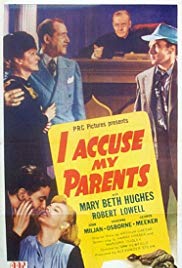
I ACCUSE MY PARENTS
US, 1944, 68 minutes, Black-and-white.
Robert Lowell, Mary Beth Hughes, John Miljan, Vivienne Osborne, George Meeker.
Directed by Sam Newfield.
This is an extremely earnest film of 1944, even the judge in the court at the end looking straight into camera to warn parents to care for their children. A screen note also says that the film was to be released for the armed forces overseas.
The film opens with a court case and the accused accusing his parents, present in the court, of neglecting and ignoring him when a boy. The film then goes into flashback, with Robert Lowell as Jim Wilson looking too old for his teenage role.
He is a star student at school, winning an essay competition, the teachers urging him to bring his mother to a meeting and she turns up drunk. He continually makes excuses for his parents, the father going off on staying away allegedly on business, the mother drinking and taunting her husband. They are often busy socialising but he continues to develop good explanations for the behaviour.
After school, he goes to work in a shoe shop and encounters a young singer in a club, Mary Beth Hughes, and is attracted to her. She, however, is the girlfriend of an ambitious gangster, jealous of her. His ploy is to employ the young man secretly on pick up jobs. Jim Wilson is eager to do this and begins to build up his money, taking his girlfriend out.
Needless to say, he is put in a compromising position, even being used as a getaway driver for thugs who just committed murder. His girlfriend is persuaded by the gangster to alienate him and put him off.
Ultimately, he decides to go to the police, is involved in a struggle with the gangster in his office, a fight with the gun, and the gangster being killed.
He is ultimately exonerated by the judge then returns to give his warning to the audience. It would be interesting to know how persuasive this film was when it was first released.
Mary Beth Hughes is not the greatest singer but she is enthusiastic. And the songs, very early in their ultimately successful career were by Jay Livingstone and Ray Evans (later Buttons and Bows, Mona Lisa, Que Que Sera).